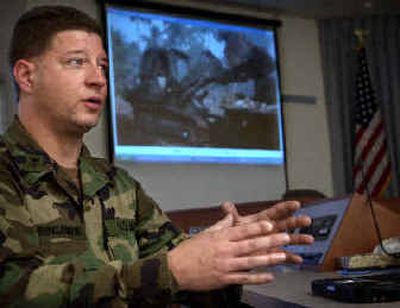Snapshots from a land of contrasts

A grief-stricken school principal pauses amid the rubble where her primary school had stood a few weeks before. (click)
The red metal wall of a locomotive is dented like a broken toy, an imprint made by the force of an ocean’s wave. (click)
A Buddhist monk sits in prayer on the second story of a building that no longer has walls or a roof, just support posts and two crumbling floors. (click)
While most Americans watched the Asian tsunami disaster unfold on television from the comfort of their homes, one Spokane Valley man witnessed the devastation from a different angle – behind a camera’s lens.
Greg “Bing” Bingaman, the city of Spokane Valley’s information technology specialist, recently returned from almost three weeks in Thailand and Sri Lanka, where he documented the U.S. military’s reconstruction effort. Bingaman, a military photographer for the U.S. Navy Reserves, described a region of contrast. On one hand, he saw a beautiful area populated by gracious people. On the other, he saw the most debris-littered mess of destruction he could have imagined.
“Every day was a decision,” Bingaman said. “Who needs what most?”
Bingaman shared his photos and his stories with Spokane Valley staffers during their lunch break Friday.
Bingaman’s journey began Jan. 6, when he boarded a plane to Texas after being given 48 hours notice. He met up with David Gordon, a military reporter, and the men flew west to Thailand from there. They are among 460 Navy Reserves journalists but were the only ones selected for the mission to Asia, Bingaman said.
Once in Thailand, Bingaman snapped photos as the headquarters were set up for Operation Unified Assistance, the U.S. military’s response to the Dec. 26 disaster that has claimed more than 160,000 lives.
Bingaman had to wait several days, though, to get a seat on a flight to the devastated shorelines, where military from this country and others, as well as civilian aid workers, were helping locals put their lives back together.
“It was either 200 pounds for me or 200 pounds of (aid) supplies,” he said.
On Jan. 14, Bingaman reached Sri Lanka. He and Gordon captured the work of the Seabees, the Navy’s construction force, who helped rebuild two schools in Koggala, a village on the southern tip of the island. They also removed a lot of debris.
“That was a major problem – where to put the debris,” Bingaman said.
Amid the destruction, though, Bingaman often found an anomaly.
“Everywhere we went, we found rubble, but the (religious) shrines were still standing,” Bingaman said, adding that he didn’t know if they were built better or if a higher power protected them.
When they arrived, the military had to take steps to avoid alarming locals, many of whom were so isolated before the tsunami hit they didn’t own televisions or radios. The site of the powerful U.S. military setting up camp after such a shocking disaster could have been disturbing, so the forces stayed in hotels to blend in. Bingaman said the hoteliers were glad to fill vacancies during what is normally the busy vacation season.
Bingaman said it’s difficult to show the extent of the destruction with still photos. And although he saw dead bodies, he didn’t aim his camera at them.
“I don’t have to look for sensationalism to sell the story,” Bingaman said.
He said he’s frustrated that the mainstream media has focused on the devastation and has covered less of the rebuilding effort. Bingaman’s photos show the military men and women carrying bricks and lumber through almost 100-degree heat, and his own uniform is stained where sweat crystallized into salt on his back.
His pictures also show the joy on the faces of locals, including two boys holding a toy truck.
“I’ve never worked in a country where we were more appreciated for our presence,” Bingaman said.